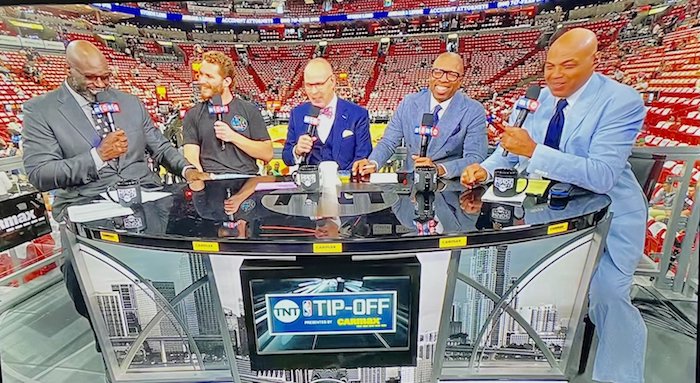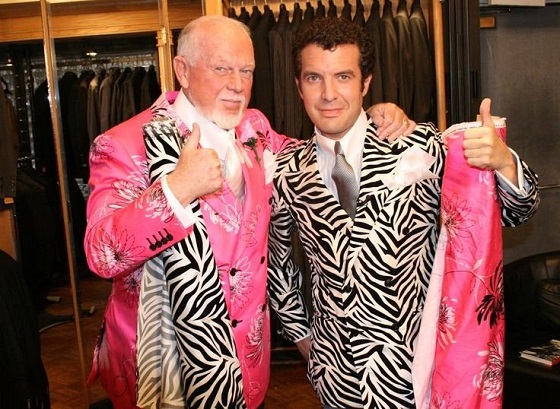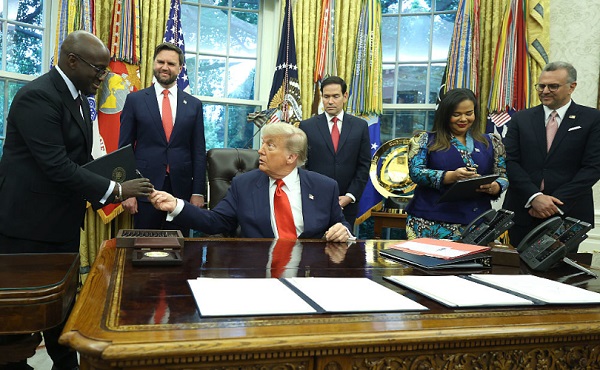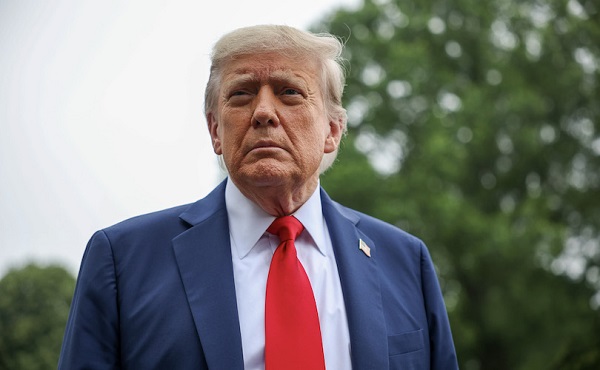Bruce Dowbiggin
Inherit The Wins: Hockey Has Its Privileges

It might not have exactly been Neil Armstrong setting foot on the moon, but Florida Panthers glitter boy Matthew Tkachuk sitting in with the TNT NBA panel of Shaquille O’Neal, Charles Barkley and Kenny Smith might have been close that magnitude of collision between cultures.
Tkachuk has become the NHL poster boy in the U.S. by leading the sad-sack Panthers to the Final. In his casual Elbo Room T-shirt he was the epitome of the Fort Lauderdale hip cross-over star as he met the panel. While Barkley has become a hockey-fan-of-the-moment, Shaq professed total, wilful ignorance of the sport beyond its fighting. Smith was not much more puck savvy.
The highlight of the chat was Sir Charles suggesting he’d like to play hockey just once because he could only get a two-minute penalty for slugging Shaq. The two men did a little faux-theatre for the cameras to promote TNT’s coverage of the NHL Final.
The other nugget from the chat was the revelation that Tkachuk went to high school in St. Louis with Celtics star Jason Tatum, whose team was about to force Game 7 against the local Heat. Talk about a sports hothouse. Host Ernie Smith also showed pictures of Tkachuk with his legendary father Keith and his brother Brady of the Senators, marvelling at the genes involved in a 527-goal scorer siring two NHLers..
It’s both a wonder— and a concern— for the NHL, as we wrote in August of 2021. Because the brothers Tkachuk are part of a trend away from random selection and more to expensive grooming of elite athletes in the sport. Is equal outcome a lost cause?
“The NHL faces a question of opportunity at the moment. But this is not a racial or gender issue. The question facing a league renowned for its blue-collar roots is ‘has hockey become a rich person’s sport, a league where being an insider has extra clout?’
Are today’s superstars a product of more than talent? Are they also the products of an expensive, exclusive grooming process that leaves the Gordie Howe farm boy archetype in the dust?

One hint of the benefits of having access to resources and people within the hockey industry is the annual spate of sons of former NHLers now being drafted each summer. In the recent draft, there was a plethora of progeny selected, many at the very top of the draft. No other league has such a high percentage of sons being selected.
There have always been a few NHL father/ son duos. Gordie Howe’s boys and Bobby and Brett Hull spring to mind. But they were not as pervasive in the league as they are today. Witness the just-passed (2021) Draft that saw a host of familiar family names getting new surnames.
Cole Sillinger (Mike), Tyler Boucher (Brian), Josh Doan (Shane), Redmond Savage (Brian), Ryan St. Louis (Martin); Shane Lachance (Scott); Nick Malik, Marek), Justin Robidas, (Stephane), Jackson Blake (Jason) and Chase Stillman (Cory) were among the sons of famous fathers drafted. Others were signed as free agents.
It was no fluke. A glance around the NHL shows many sons of former stars getting steady work. Matthew and Brady Tkachuk (Keith), Kasperi Kapanen (Sami), Brandon Sutter (Brent), William and Alex Nylander (Michael), Sam Reinhart (Paul), Max Domi (Tie), Samuel Poulin (Patrick), Tag Bertuzzi (Todd), Ryan Johnson (Craig), Tyson Barrie (Len), Landon Ferraro (Ray), Marcus and Nick Foligno (Mike), Nolan Foote (Cal), Ryan MacInnis (Al) Brendan Lemieux (Claude), Ryan Donato (Ted), Daniel Audette (Donald) and Dominic Turgeon, (Pierre) are just a sampling of the direct relationship between father and sons..

The hockey pipeline is full of young men whose fathers could give them a hockey education but who also knew many of right people to tap into. The sophisticated training and arduous diet regimes are getting more like Tom Brady and less like Gump Worsley. And they’re expensive— even in Howe’s home nation of Canada which honours its roots.
This discipline and access is reflected in the United States where the boom in hockey participation is resulting not in farm boys and rink rats but in privileged sons and daughters of highly paid NHL stars getting an inside track on make the league or the Olympics.
NHL veterans in both the U.S., Europe and Canada know the inner workings of agents, independent training academies and skill trainers to help their sons past some of the highest hurdles in development. If they handled their millions properly they also have the funds to open doors for young stars.”
Author Malcolm Gladwell popularized the notion of taking 10,000 hours to translate talent into the finished product of a genius. It takes money to allow a young person that time, money that only a select number of families can provide. If you are a child in a single-income home or in a remote part of the country away from facilities, equipping and training a young prospect quickly gets out of the reach of parents of modest means.
Perhaps the most telling development story was that of Montreal goalie Carey Price, whose father bought a $13,000 four-seat Piper Cherokee plane to fly young Carey back and forth 320 kilometres to hockey practices all winter in northern B.C.
Where the NHL was predominantly players from blue-collar backgrounds till the Euros arrived in the 1970s, today it is often constituted of young men from families of means and education. Often, like Tkachuk, they’re in training academies with future stars in other sports. The idea of the farming

In that way, through no fault of Walter Gretzky, the super coach, hockey has become a sport for families of means or friends with means. He taught parents that the proper training and equipment was imperative. And that doesn’t mean simply the rink in your backyard. With a new pair of skates costs $500, a stick costs $125 or a set of goalie equipment runs into a few thousand dollars you are losing a segment of the population to financial costs. And so Walter’s legacy of training development is forever tied to a big price tag.
To say nothing of the progeny of NHL stars like Keith Tkachuk helping give their kids a hand-up in making it to the league and its vast piggy bank.
Sign up today for Not The Public Broadcaster newsletters. Hot takes/ cool slants on sports and current affairs. Have the latest columns delivered to your mail box. Tell your friends to join, too. Always provocative, always independent. https://share.hsforms.com/16edbhhC3TTKg6jAaRyP7rActsj5
Bruce Dowbiggin @dowbboy is the editor of Not The Public Broadcaster A two-time winner of the Gemini Award as Canada’s top television sports broadcaster, he’s a regular contributor to Sirius XM Canada Talks Ch. 167. Inexact Science: The Six Most Compelling Draft Years In NHL History, his new book with his son Evan, was voted the seventh-best professional hockey book of all time by bookauthority.org . His 2004 book Money Players was voted sixth best on the same list, and is available via http://brucedowbigginbooks.ca/book-personalaccount.aspx
Bruce Dowbiggin
Don & Rick: Canadian Icons, Mixed Messages, Lasting Impacts

“Well, Tim, this is our last show. . . . Thanks everybody for listening and toodaloo,” 91-year old Don Cherry allegedly on his final podcast episode.
Once upon a time in a public broadcaster far, far away there was an identity crisis. Who should we be as we enter the 21st century? We depend on government for our financing, but our audience relies on people who hate government.
At CBC that argument could be summed up by two figures on the TV network. Rick Mercer. Don Cherry. Both were brilliant communicators, masters of the craft of holding eyeballs. But they represented diametrically opposed audiences. Mercer was the glib political voice of This Hour Has 22 Minutes. Cherry was the bombastic voice of Hockey Night in Canada, as Canadian as the brown beer stubby.
Mercer was worshipped by the folks in the C suite and liberal media. With his searing walking shots he lanced egos and asked uncomfortable questions. He called out sacred cows. Yet there was never any doubt in CBC’s upper reaches about whose side he was on in the culture war at CBC. He was safe.
Cherry was the unpredictable occupant of Coach’s Corner, the bombastic voice of white anglo hockey culture. He was abrasive and unforgiving. His first-period rants beside his Topo Gigio Ron Maclean were must-watch for the demographic. They also, it seemed, constituted must watching for his critics.
[Confession: I was one of his critics, paid to be so. We tangled often over his act. He ripped me in the 2004 NHL playoffs, alleging I said he was insincere about kids with cancer. During the infamous 1987 World Junior brawl he said I was a coward who wouldn’t defend his own kids in a fight. etc. He sicced his bots on me. While I disagreed with much of what he said, I defended his right to say such things. My beef was mostly with HNIC which refused to allow any dissent to Cherry’s act on the show . It was a noisy one-note symphony.

Don was durable, holding his prime position for decades, putting himself above the title many Saturdays with headline material. In the sea of pearl clutchers at CBC he stood out. While the suits above recoiled at his Canadian Legion catechism, they also knew he was an asset they could play when they went for funding in Ottawa. “See, we have all sorts of political views on the network.”
When CBC lost its HNIC franchise to Sportsnet Cherry became someone else’s problem. Eventually the Woke folk at Rogers tired of telling him to knock off the politics and cultural stuff. He was let go in 2019 for saying what he’d always said. Maclean then put in the knife to save his own hide.
Mercer’s highly rated act continued unabated till 2018. One of his most popular gigs— the one most likely to appeal to posh Canadians— was talking to Americans about Canada. It was brilliant in its simplicity. Go to famous colleges and universities to plumb the depths of their Canadian knowledge. Likewise, buttonhole well-known American politicians.

The topics were many and ridiculous. Should Canada protect the famous location Joe Clark’s Hole? What should Canada do about its melting national igloo? Could they congratulate Jean Chretien on a rare political feat called a “Double Double” in which he received support from both sides of the Canadian parliament.
He asked Al Gore about Canada moving the capital city from Kingston, Ontario to Toronto (Gore thought it smart). He convinced tourists at Mount Rushmore that the mineral rights to the mountain had been sold to a Canadian firm that was getting ready to drill for oil in Lincoln’s forehead.
He asked Americans to condemn Canada’s practice of euthanizing senior citizens by setting them adrift on Northern ice floes. In a famous moment, future President George W. Bush failed to correct Mercer when he referred to Chrétien as “Jean Poutine”
Mercer always said he didn’t think Americans were ignorant. Eighty percent had the right responses and those never made it to air. For the rest it was just that they couldn’t resist an open mike and having a take on things they knew nothing about. He had affection for them.
For Canada’s Left, insecure in its northern faculty-lounge, that subtlety was lost. Mercer’s routines reinforced a smug anti-American attitude in the Liberals and NDP base. All they saw was a nation of nitwits. “Look, what bozos!” The orientation of the fashionistas turned away from the U.S. to supposed European sophistication and societal controls for climate, population growth and Covid. Hello, Mark Carney.
This bias was reinforced by the increasingly self-loathing voices on the cable news of the American Left. Every GOP figure from George W. Bush till Trump today became a comic character. Canadian lefties adored it. As we’ve written often the snide attitude allowed Canadians to ignore that Americans were protecting them for free and keeping them rich. And taking the overflow from Canadian’s prized healthcare system.
This arrogance culminated in the March election where the mere mention of Trump sent Canadians fleeing back to a Liberal administration that was moribund after a decade of incompetence. It has an echo in Toronto’s Hockey Hall of Fame again declining to award Cherry the Foster Hewitt award as a legendary TV journalist. Love him or hate him he’s earned it. It’s arguable whether the aging Cherry will even be around to be chosen next year.
For sure his political impact will resonate for long after he’s gone in the populist resurgence in western Canada and elsewhere. If only Rick Mercer were allowed back on CBC to cover it.
Bruce Dowbiggin @dowbboy is the editor of Not The Public Broadcaster A two-time winner of the Gemini Award as Canada’s top television sports broadcaster, his new book Deal With It: The Trades That Stunned The NHL And Changed hockey is now available on Amazon. Inexact Science: The Six Most Compelling Draft Years In NHL History, his previous book with his son Evan, was voted the seventh-best professional hockey book of all time by bookauthority.org . His 2004 book Money Players was voted sixth best on the same list, and is available via brucedowbigginbooks.ca.
Bruce Dowbiggin
What Connor Should Say To Oilers: It’s Not You. It’s Me.

This just in. Connor McDavid is on track to be the greatest hockey player ever. Apologies to the Gretz/ Orr/ Howe partisans. But if he stays healthy and gets the hell out of Edmonton he will be hands-down the best ever. He is equal measures of Gretzky’s intuitive genius, Orr’s 200-foot impact. Howe’s sandpaper attitude. It’s an honour to watch him.
We know, we know, if he is so great why couldn’t he get the Oilers over the hump, particularly the past two seasons against Florida? Gretz, Orr, Howe all won Stanley Cups while leading their teams. So did Mario Lemieux. Fair point. But Howe in his prime never played more than two series in the postseason. Orr often played just three. Gretz teams often bagelled opponents for years.
McDavid’s teams the last two years have had lengthy paths to tred. Just getting to a Final is a huge accomplishment. Repeating that feat (going seven then six games) in the Final is humungous. It’s exhausting, mentally and physically. That’s why so few teams do it.
Still, that’s not the point. We have been asking since 2018 how long McDavid will hobble his legacy by staying in Edmonton. Those early columns were talking about a team that missed playoffs or did a Maple Leafs fold early on. The current iteration of the Oilers has gotten to the brink. They have players who’ve been around a while. And fell short.

Now the Oilers are an old team, the oldest in the regular season, the oldest team in the playoffs this year. Teams carrying more than two plus-30 players have a miserable track record of winning Cups. And the Oilers have zero Grade A prospects in the pipeline. At 28, McDavid is a young guy on their roster. Not good.
As the hockey world knows he can sign an extension on July 1 to follow the contract he has now. Money will be no object as the NHL salary cap (finally) goes up. Term will be forever if he wants it. His running mate Leon Draisaitl is tied up till age 36. The Oilers desperately want him to stay after the Gretzky fiasco in 1988. So what is he going to do? He’s got national endorsements in Canada, but in the U.S.? Connor who? The sky is the limit.
Oilers fans palpitating over the future of their star were looking for hints as to his mindset when he met the media following the Oilers loss in six games to Florida. It was a chance for him to say he’s staying, he loves the place, his wife is committed to freezing every winter in the Alberta capital. He could have cried and said “Mess told me not to do that”.
What they got was a lot of maybe. Yes, he kept the doors open, but he said he needs time to see the landscape till the clock tolls on July 1. He needs to examine whether this veteran team has a future. Because in a few years they’ll be like Howe’s Detroit teams in the 60s, a played-out dynasty.
Under NHL rules no team can contact him about signing. But he will know that everyone will want him at a max deal. Some will offer no state income tax. Some will have teams on the cusp of the Cup he desires (see Matthew Tkachuk to Florida in 2023). Some will be giant U.S. media cities with the ability to make him what Gretzky became in L.A. Some will offer warm weather and anonymity away from the rink.
These are all knowns. For the impatient, teams can approach the Oilers now about a trade. So he’s holding all the cards. It’s prom night and he gets his pick. Unless Edmonton (gulp) jumps the gun on a trade.

Let’s play Peter Pocklington for a minute here and see this from the Oilers’ POV. Pocklington traded Gretzky, because Peter was broke. That’s not Darryl Katz’s problem. His problem is his team is about to get ancient. There is no McDavid for Draisaitl on the horizon. Plus, you’ve tied up several players (Nurse, Nugent Hopkins) to contracts they can’t hope to play up to. And youngish players coming into free agency.
He must address the other side of the 1988 Gretzky equation. How to get full market value for a superstar? Which means getting another star to help Draisaitl going forward. You could let the two play out the string together in Edmonton, of course. But with so many strong teams in Colorado, Vegas, Dallas, even Winnipeg that would be a hard slog. And by the time you realized that it would be too late.
The smart play, as Michael Corleone would say, is move fast. Trade McDavid before the start of next season for a boatload of young players to supplement Draisaitl. Take a short-term PR hit but live to compete another day.
Of course, Katz is not going to trade McDavid. He’s a fanboy owner. He’ll throw the Rexall kitchen sink at him and hope that’s enough. McDavid will be patient (if he’s smart). The “will-he-sign?” drama will bleed into the next season, a millstone for the team. The distractions will mount before Edmonton realizes that an unsigned McDavid is a liability. And Connor on a max deal with a minus team is no bargain either.
Remember the re-structured Oilers won a Cup in 1990 using Mark Messier and the players they got for Gretzky. Think about it, Edmonton.
Bruce Dowbiggin @dowbboy is the editor of Not The Public Broadcaster A two-time winner of the Gemini Award as Canada’s top television sports broadcaster, his new book Deal With It: The Trades That Stunned The NHL And Changed hockey is now available on Amazon. Inexact Science: The Six Most Compelling Draft Years In NHL History, his previous book with his son Evan, was voted the seventh-best professional hockey book of all time by bookauthority.org . His 2004 book Money Players was voted sixth best on the same list, and is available via brucedowbigginbooks.ca.
-

 Business23 hours ago
Business23 hours agoEurope backs off greenwashing rules — Canada should take note
-

 Automotive23 hours ago
Automotive23 hours agoPower Struggle: Electric vehicles and reality
-

 Energy2 days ago
Energy2 days agoCarney’s Bill C-5 will likely make things worse—not better
-

 Brownstone Institute1 day ago
Brownstone Institute1 day agoFDA Exposed: Hundreds of Drugs Approved without Proof They Work
-

 Energy1 day ago
Energy1 day agoChina undermining American energy independence, report says
-

 Business1 day ago
Business1 day agoTrump on Canada tariff deadline: ‘We can do whatever we want’
-

 Automotive1 day ago
Automotive1 day agoElectric vehicle sales are falling hard in BC, and it is time to recognize reality.
-

 International2 days ago
International2 days agoTrump predicts Israel-Hamas ceasefire ‘within the next week’





